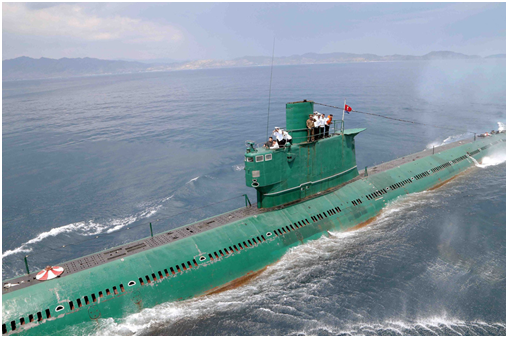I have blogged about the possibility of nuclear war and the probable repercussions. The most belligerent nuclear power in the world has only a few nuclear bombs and short range delivery systems. That country is North Korea. Recently, there has been an increase in hostilities as a result of a couple of South Korean soldiers being killed by a land mine in the Demilitarized Zone between the two Koreas. South Korea responded by firing artillery at the North and the North fired back. Both Koreas went on high alert, massed troops at the border and hurled threats at each other. The U.S. military in South Korea also went to high alert.
On August 21st, fifty North Korean submarines which were stationed around the peninsula were reported to have vanished from South Korean and U.S. radar systems. This meant that they had left their bases and submerged, bound on unknown missions. It was feared that the leader of North Korea was preparing a preemptive strike on South Korea in case the negotiations for a lessening of tensions failed. Some military analysts thought that the submarines might be carrying commandoes to infiltrate into South Korea. Other analysts were concerned that the submarines might be preparing to attack civilian and military ships around the peninsula.
A big concern among South Korean officials was that some of the submarines might be carrying nuclear weapons. North Korea recently successfully launched a ballistic missile from a submarine. It has also been reported that North Korea has developed a nuclear weapon that could cause a huge electromagnetic pulse (EMP) over the continental U.S. which would result in major damage to the U.S. power grid and electronic systems. North Korea launched a satellite in 2013 that may have a super EMP weapon onboard. They might launch such an attack on the U.S. in order to prevent the U.S. from supporting their assault on South Korea.
The detonation of a small nuclear warhead in the five to ten kiloton range fifty miles above the center of the U.S. could devastate the U.S. With the power grid down, fuel and traffic would stop, water and sewage systems would fail and our society would collapse. Worst case estimates are that as many as nine out of ten citizens of the U.S. would be dead in the first year after the strike.
Fortunately for the people of the world, a truce was worked out between the two Koreas in the early morning hours of August 25th. South Korea agreed to stop blasting propaganda from loud speakers at the border between the two Koreas and North Korea apologized for the deaths caused by the landmine. A new border trade zone between North Korea and China was also announced on the 25th. Whether or not that had anything to do with the truce is unknown. The fifty North Korean submarines have begun returning the their bases.
With only a few nuclear weapons and short range delivery systems, many people thought that North Korea was really only a threat to its immediate neighbors. However, with the EMP possibility, this small poor belligerent nation on the other side of the world could essentially destroy the U.S. As little comfort as it may bring, if this horrible event did happen, at least the entire global civilization would not be utterly destroyed by a nuclear winter. Even so, the impact of the collapse of the U.S. would bring down the global economic system and would probably trigger local wars over vanishing resources.
North Korean submarine:
